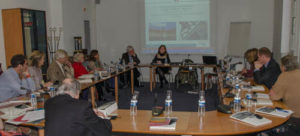Achieving greater social diversity among the high-powered students at the Ecole Nationale de l’Administration is one of the challenges facing the prestigious school for France’s elite managers and civil servants, AAPA members and their guests were told on Jan. 28 by ENA’s director, Nathalie Loiseau.
Mme Loiseau acknowledged that ENA’s recruiting process tends to reproduce privilege. “It is founded on recruiting the best, but sometimes we have to ask ourselves if we’re not recruiting the children and grandchildren of the best,” she acknowledged, as most of ENA’s student intake are children of teachers. “They have an advantage from the outset in that they understand the functioning of the education system. And that in itself is discriminatory” as it tends to perpetuate a privilege, she said.
Mme Loiseau stressed that ENA is less interested in the knowledge of its pupils than in their ability to ask the right questions. She defended ENA against criticisms that have been leveled against ENA in the past, and said she is irritated by the use by French media of the word ‘énarque’ and its derogatory connotations. “I hate the word ‘énarque’. It’s ugly, it sounds like oligarch!” she said, adding that the term apparently was first coined by former Socialist minister Jean-Pierre Chevènement, himself an ENA graduate.
Simply expanding the number of students as a way to encourage greater social diversity isn’t the right answer, and would be a “gadget response,” she said. And the school has to shake off the notion that public service is a vocation that requires a sacrifice.
Mme Loiseau said that under her guidance, ENA’s students will be encouraged to travel abroad, to visit socially diverse cultures and get experience in the private sector so as to get rid of pre-conceived notions about the role of public service.
Only 1% of the school’s graduates adopt a political career, she observed, and it’s essential that they be trained to plan ahead rather than reacting to events, she said. And politicians generally have to understand that ENA graduates in their services aren’t just there to implement policy decisions, but can formulate them as well. Only 5% of graduates become executives in the private sector, while the bulk go on to become senior civil servants.
Mme Loiseau, a former diplomat, surprised the group when she disclosed that excellent proficiency in English will only become part of ENA’s entry exam in 2018. “For me, English is not a foreign language, it’s a working tool, like Word or Excel,” she said.
-Clare Byrne and David Pearson
